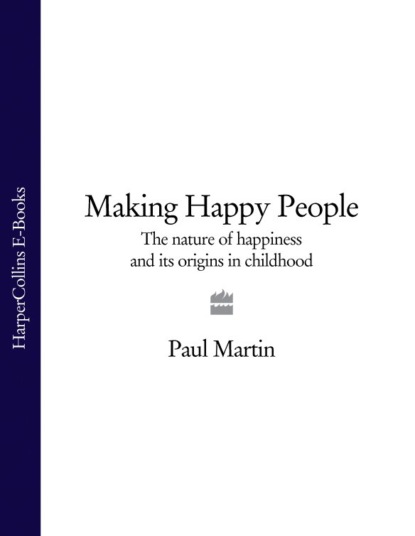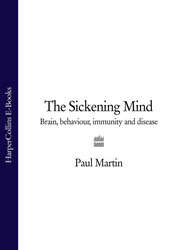По всем вопросам обращайтесь на: info@litportal.ru
(©) 2003-2024.
✖
Making Happy People: The nature of happiness and its origins in childhood
Автор
Год написания книги
2019
Настройки чтения
Размер шрифта
Высота строк
Поля
3. Freedom from excessive anxiety
We saw in chapter 2 that happiness is a mixture of three basic elements: pleasure, the absence of displeasure, and satisfaction. Being prey to frequent unpleasant emotions can erode happiness. And the unpleasant emotion that probably does most to erode happiness among the largest number of people is anxiety – that nagging sense that something might go wrong. Research confirms that anxious individuals who frequently worry about themselves or their loved ones tend to be less happy. Conversely, happy people typically experience low levels of anxiety and are less inclined to feel anxious in any given situation.
In addition to being an everyday source of displeasure, anxiety erodes happiness in other ways. Someone who continually feels anxious will find it harder to focus on whatever they are doing, or to pay full attention to their personal relationships. Anxiety fosters a distracted self-consciousness that eats away at other sources of happiness.
Some people are consistently more prone than others to be anxious, worried and emotionally changeable; they are inclined to fret even when objectively there is little to fret about. Psychologists describe these natural-born worriers as neurotic. Not surprisingly, individuals who score high on measures of neuroticism are found to be less happy. Indeed, neuroticism is one of the stronger predictors of unhappiness.
4. Communication skills
The ability to exchange information and feelings with other people is crucial for happiness and success. You are unlikely to maintain good relationships with partner, friends, relatives, parents, children or colleagues if you are unable to communicate effectively with them or if you keep inadvertently sending them the wrong messages. Moreover, education is a social activity, and virtually every job involves interacting with other people. Poor communication skills can therefore be a real impediment to success at school and in the workplace.
Happy people are generally good at making themselves understood, both emotionally and rationally, and good at listening to other people. (Communication is of course a two-way process, although you would not think so from the way some people behave: perhaps you know someone who is permanently jammed on transmit.) Good communicators are capable of communicating through all the available channels, using speech, facial expressions, gestures, body language and the written word, as appropriate. Adequate communication skills may not be a sufficient condition for happiness, but they are certainly necessary.
5. Engagement in meaningful activity
We humans are by nature problem-solvers. We are generally happier when actively engaged in some reasonably challenging task, rather than passively witnessing other people’s experiences on a TV screen. Happy people spend at least some of their time engaged in meaningful and satisfying activities. Happy children socialise, play games or learn in the classroom; happy adults throw themselves into their jobs, hobbies, sports or voluntary work. The precise nature of the activity seems to be unimportant, provided it is reasonably demanding and worthwhile. Bored people with nothing much to do are seldom very happy.
Most adults spend a large proportion of their waking lives at work, so it is not surprising that paid work has an important bearing on happiness. Having a satisfying job is strongly connected with happiness. And, as with many other ingredients of happiness, the connection is two-way: job satisfaction contributes to happiness, and happiness in turn fosters job satisfaction. Happy people enjoy their jobs more. Despite media stories about work-related stress and the joys of downshifting, research shows that most people feel at least neutral about their job, and around one in three positively like what they do for a living. Noel Coward once opined that the only way to enjoy life is to work, because work is so much more fun than fun.
Work brings far more than just money. A satisfying job can also bring structure and meaning to one’s life, mental and emotional stimulation, personal relationships, regular opportunities to use and develop skills, social status, self-esteem and a sense of identity. Personal relationships are a particularly important benefit of work, and the evidence shows that people who work in small, cohesive groups tend to be the most satisfied with their job and generally happiest.
Pay, on the other hand, has a surprisingly weak influence on job satisfaction – certainly when compared with personal relationships or the nature of the work itself. People doing unpaid voluntary work often enjoy it more than people who are paid to do something similar. In fact, research shows that pay is more often a cause of dissatisfaction than satisfaction. Individuals who regard themselves as poorly paid relative to others soon become disgruntled, whereas better pay does surprisingly little to boost satisfaction. People who are highly successful at work typically report enjoying their job for its own sake, not because it is well paid.
The strength of the correlation between job satisfaction and overall happiness varies between different cultures. Among Americans of European origin, job satisfaction is closely linked to overall happiness and to satisfaction with other spheres of life, including satisfaction with marriage, finances, family and health. But the link between job satisfaction and overall happiness is found to be weaker among African-Americans and Asian-Americans. In some cultures and ethnic groups, individuals appear to derive more of their happiness from other areas of life such as their family; jobs are regarded more as a source of income and therefore make a smaller contribution to overall happiness. In highly individualistic societies like the USA, self-worth and happiness derive more from personal achievements and less from being part of a group.
For the same reasons that work provides many ingredients of happiness, unemployment is a powerful cause of unhappiness. Large bodies of evidence confirm that unemployed people are generally much less happy and much less healthy, both mentally and physically, than people with jobs. On average, they experience more depression, more anxiety, lower self-esteem and greater unhappiness than people in employment, even those with low-paid jobs.
The consequences of unemployment extend far beyond the purely financial. In most cases, the psychological, emotional and social effects are much greater. Even in countries where the unemployed receive generous state benefits, they are still very unhappy. Making up for lost wages softens the blow, but only slightly. Unemployment can be particularly damaging for those who have the furthest to fall, notably the middle-aged, the highly educated, and those living in areas of low unemployment where their change in status is more apparent. Unemployment even reduces the happiness of those who remain in work, because it heightens their anxiety that they too might lose their job. Any government that truly wants to promote national happiness should give a high priority to minimising unemployment.
6. A sense of control
Another common characteristic of happy people is feeling they have some control over their lives, rather than being passive victims of chance or at the mercy of others. Conversely, a belief that you are helpless and unable to affect what is happening to you, or that your daily life is largely governed by random events beyond your control, is often associated with unhappiness and depression.
Happy people tend to feel more empowered and more in control of their lives than unhappy people. They are also more likely to feel they have the skills, knowledge and motivation to exert that control – a sense that psychologists refer to as self-efficacy. Research shows that young people who report feeling high self-efficacy are happier on average. Education obviously has a major role to play in developing self-efficacy and a sense of control.
7. A sense of purpose and meaning
A life that is meaningful and has some purpose to it is more likely to be a happy life. Someone who is swept along by the tide may still be reasonably happy, but someone who knows where they want to go, and why, will probably be happier. Studies have confirmed that people who regard their life as meaningful tend to be happier and more satisfied, other things being equal. Their health benefits too: Japanese researchers have discovered that elderly people who have a strong sense that their lives are meaningful (a concept known in Japanese as ikigai) live significantly longer on average than those whose lives lack meaning.
A sense of purpose and meaning can come from many different sources, including family life, career, study, creative activities, politics, religion or voluntary work. Many parents derive a considerable sense of purpose and meaning from parenthood. What these pursuits all have in common is providing long-term goals. According to research, individuals whose daily efforts relate directly to achieving their longer-term goals tend to be happier than those whose strivings are unrelated to their life goals.
Personal goals give a sense of meaning and purpose to the grind of daily life. But they must be realistic and attainable. Having goals or aspirations that exceed what can realistically be achieved is a recipe for unhappiness. When children are young, their parents and teachers usually set their goals for them, and getting the balance right can be tricky. Children need to be stretched so that they can learn and develop, but if the bar is set too high they will experience mostly failure, and their motivation and self-esteem may wilt. If on the other hand the bar is set too low, children may not be sufficiently stimulated and therefore fail to realise their potential. You can only set the bar at the right height if you know the child’s individual capabilities and limitations.
8. Resilience
To remain happy, we must be able to cope with a certain amount of upset and stress. Even the most fortunate individuals experience some setbacks, disappointments and problems, no matter how comfortable their circumstances. And of course stress is not something that affects only adults: children and young people also encounter potential sources of stress in their lives, including relationship problems with friends or family, high-stakes exams, and anxieties about their own attractiveness. Like adults, they need to have effective methods for coping.
The capacity to maintain or restore well-being in the face of adversity is referred to by psychologists as resilience, or hardiness. The evidence confirms, unsurprisingly, that resilient individuals are usually happier than those who are more easily cast down by life’s inevitable upsets. Individuals who display high levels of resilience are typically found to have supportive personal relationships, persistence, motivation, an ability to plan ahead, and practical knowledge. Resilience is actually a common characteristic of children, prompting one developmental psychologist to call it ‘ordinary magic’. Even for children growing up in deprived or difficult circumstances, there is nothing inevitable about future problems. Many of them will cope.
9. Self-esteem
If you are a happy person, the chances are you will feel reasonably good about yourself as well as your life. You will have good self-esteem, to use the jargon. Self-esteem, which has become a somewhat overused term in recent years, is usually defined as how you judge your own worth or value as a person, both rationally and emotionally. The media and self-help books abound with glowing references to its magical powers.
Individuals with high self-esteem are generally found to be happier, healthier and better adjusted than those with low self-esteem. On average, they have better social relationships, cope better with illness and other problems, and are less likely to suffer from anxiety or depression. Studies have found that children who have high self-esteem are statistically less likely to be unemployed when they become adults; they also earn more on average and are less likely to commit crimes. Low self-esteem, on the other hand, can impair social relationships. If you are not happy about yourself, you will probably find it harder to be happy about your relationships with other people as well. Low self-esteem is also associated with a range of other problems including drug and alcohol abuse. Children with low self-esteem are at greater risk of becoming problem drinkers later in life.
Self-esteem is about liking yourself. This makes self-esteem different from satisfaction – which is about how you evaluate your life – and different from overall happiness. In principle, you could have reasonably high self-esteem yet still be dissatisfied with your life and generally unhappy, perhaps because of how you have been treated by other people. Having loads of self-esteem will not prevent you from being a miserable curmudgeon or a vicious swine.
(#litres_trial_promo) That said, self-esteem and satisfaction tend to be quite closely correlated. By and large, people who have high self-esteem are also likely to be satisfied with their lives.
The strength of the association between self-esteem and overall happiness varies according to the kind of society in which people grow up and live. In highly individualistic societies like the USA and UK, self-esteem has a fairly strong influence on overall happiness. However, the association is found to be weaker in more collectivist societies such as Japan, China, India, Bangladesh and Korea, where there is less emphasis on the self and more on harmonising with the group. For example, a study which compared students in the USA and Hong Kong found that maintaining harmony in personal relationship had a bigger influence on the happiness of the Asian students, whereas self-esteem loomed larger in the lives of their American counterparts.
High self-esteem can be a mixed blessing if it is built on self-delusion or vanity, as is sometimes the case. Moreover, trying to boost children’s self-esteem by praising them indiscriminately is not a quick way of making them happier or improving their academic performance, as some enthusiasts have claimed. Self-esteem is not all it is cracked up to be. We will return to its complexities and pitfalls in chapter 7.
10. Optimism
A common (though not universal) characteristic of happy people is optimism – that is, a general tendency to expect that life will go well and future events will have favourable outcomes. Like self-esteem, optimism has become a voguish and somewhat overused concept in the self-help literature, where it is presented by some pundits as a form of panacea. Nonetheless, numerous scientific studies have found that optimists tend to be significantly happier, healthier, better able to cope with stress, longer-lived and more successful than pessimists, other things being equal.
You can have too much of a good thing, however. A mindlessly optimistic Pollyanna attitude that flies in the face of reality will create unrealistic expectations. (I have sympathy with the cynic who remarked that a permanently cheerful, optimistic attitude may not solve all your problems, but it will annoy enough people to make it worth the effort.) A certain amount of ‘defensive pessimism’ can be a good thing if it helps to avoid unnecessary disappointment. We will return to this topic in chapter 7.
11. Outward focus
By and large, happy people do not spend most of their time thinking about themselves and dwelling on their own feelings. Rather, their attention tends to be focused outwards on the world around them. In contrast, a tendency towards brooding introspection and a belief in looking out for number one are common characteristics of unhappy people. The philosopher Bertrand Russell wrote of how he started life as an unhappy child but became happier as he grew older, thanks mainly to a dwindling preoccupation with his own self. Russell argued that a person cannot be happy if they suffer from what he called the disease of self-absorption. ‘The man who can centre his thoughts and hopes upon something transcending self,’ he wrote, ‘can find a certain peace in the ordinary troubles of life which is impossible to the pure egoist.’
Self-absorption undermines happiness in many ways. Someone who dwells on their own feelings is unlikely to be brilliant at developing and maintaining close personal relationships. They run the risk of giving little affection and receiving little in return. Self-absorbed people can behave kindly towards others when the need is obvious, but the person to whom kindness comes naturally is more likely to sustain it. The self-absorbed and inwardly-focused can also fall prey to the crippling belief that they alone are responsible for all the bad things that happen to them. Someone who believes, for example, that they are lonely because of fundamental flaws in their personality or appearance may conclude that trying to form new relationships is a waste of time. Their inward focus thereby reinforces their isolation and adds to their unhappiness.
Happiness requires a certain transcendence of the self. Many people unconsciously try to achieve this by distracting themselves with TV, alcohol or recreational drugs, but usually with only limited and temporary success. These tactics might provide some distraction for a few hours, but little more. A better way to achieve outward focus is by regularly engaging with absorbing activities.
The findings from research generally confirm that outward focus is associated with happiness and mental health, including lower rates of depression. Among other things, individuals who are concerned about other people, and not just themselves, are less affected by stress. Outward focus remains important for happiness in old age as well. Studies have found that elderly people whose personal goals and aspirations revolve around an interest in the well-being of others are usually happier than those who are concerned mostly with looking after themselves.
As with many other basic ingredients of happiness, the connection between outward focus and happiness works in both directions. Being outwardly focused contributes to happiness, and being happy makes us more outwardly focused, creating a virtuous circle. The more you avoid thinking about yourself all the time, the happier you become; and the happier you become, the easier it is to avoid thinking about yourself.
The idea that outward focus promotes happiness is, of course, central to many religions and ancient schools of thought, and may contribute to their success. However, outward focus does not fit comfortably with the prevailing attitudes of our current consumerist society. The ‘me’ culture that predominates in the USA and UK revolves around the self, attaching prime importance to individual choice, personal fulfilment and self-esteem. This mindset does little to encourage the thought that we would all be happier if only we were less self-obsessed. Parts of the self-help industry have added fuel to this fire. Most self-help books are, as their name suggests, all about the self, and the worst examples encourage their disgruntled readers to scrutinise their own navels even more closely.
12. Present- and future-mindedness
We are better equipped to be happy if we can enjoy the present, prepare for the future and avoid dwelling on the past. Happy people are usually able to think ahead, but they do not spend their lives waiting for some imaginary future or endlessly mulling over bad things that happened in the past. They are also capable, at the right times, of losing themselves in the here and now and relishing the present moment.
Our consumerist culture encourages people to strive after things that they believe, often wrongly, will bring them happiness in the future – notably money, material possessions and social recognition. Meanwhile, they find it hard to enjoy the present because their thoughts are focused on a future state they have not yet attained and perhaps never will. Happy people can prepare for the future without having to live there, and they can savour the moment without sticking their head in the sand.
Many philosophers, religious thinkers and self-help gurus have stressed the importance of being able to live in the present. A starting point is to become ‘grounded’—that is, gently aware of your current surroundings, rather than fretting about all the things you have to do. Being grounded and focused on the present moment can bring pleasure and calm. It is certainly a useful skill that any busy person would benefit from learning. Various practical techniques have evolved over the centuries for clearing the mind, silencing the cacophony of mental activity and becoming mindful of the present. However, most people notice some improvement if they simply pay attention to their own breathing for a minute or two.
Being rooted in the present can be pleasant, but it does little to produce satisfaction – one of the three fundamental elements of happiness. Often, the course of action that will ultimately bring the greatest satisfaction, and hence the greatest overall happiness, requires a degree of future-mindedness. Happy people generally have a well-developed capacity to control their immediate urges and take the longer view – an important capability that psychologists refer to as delayed gratification.
In a series of experiments conducted in the 1970s and 1980s, American psychologists investigated delayed gratification in children, and its links with other aspects of personality. In a typical experiment, a pre-school child was offered a tempting marshmallow; if the child was able to wait for, say, 15 minutes before eating the marshmallow then he or she was rewarded with a second marshmallow. Some children were able muster the self-control needed to delay their gratification, but others succumbed to temptation and ate the first marshmallow immediately, even though they knew this meant forgoing the second. (You probably know the feeling.)
The important discovery was that children who were better able to delay their gratification at the age of four or five grew up to become more competent adolescents. Follow-up studies conducted a decade later found that individuals who could wait longer to receive a bigger ultimate reward at the age of four or five developed into adolescents who were socially and academically more competent, better able to cope with frustration and stress, and better at communicating than those who lacked self-control. They also achieved more at school. A prominent expert on self-esteem later commented that ‘self-control is worth ten times as much as self-esteem’.
13. Humour








